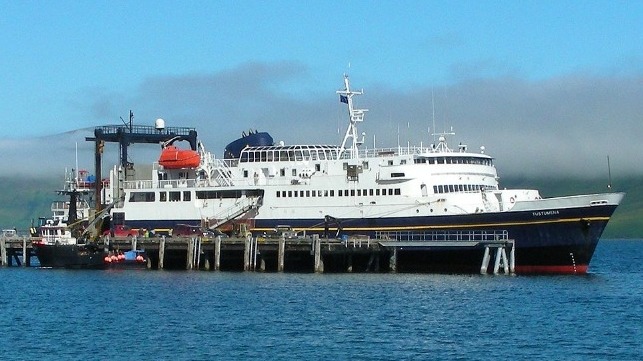Dutch Harbor Ferry Sidelined Due to COVID-19 Outbreak on Board

The Alaska Marine Highway ropax ferry Tustumena has gone temporarily offline after completing just one voyage for the 2020 season, sidelined by an onboard coronavirus outbreak. She is now scheduled to return to service at the end of June.
At the end of the Tustumena's first seasonal trip from Homer to Dutch Harbor, a female crewmember developed mild COVID-19 symptoms and tested positive. The ferry turned back from Unalaska and returned to Homer, arriving Monday night with six passengers and 36 crewmembers - all Alaska State residents - quarantined on board. All underwent COVID-19 testing in Homer, and six additional crewmembers tested positive, bringing the total to seven.
The positive crewmembers remain on board in isolation, and the passengers and some of the crew have been allowed to return home for self-quarantine. A portion of the COVID-negative crew remains on board to maintain vessel operations and will remain separated from the COVID-positive individuals.
A contact tracing effort is now under way to identify other individuals who may have had contact with the COVID-positive crewmembers. On the way out to Dutch Harbor, Tustumena was scheduled to call at multiple ports along the Alaska Peninsula and the Aleutian chain, including Kodiak, Chignik, Sand Point, King Cove, Cold Bay, False Pass and Akutan. Passengers who disembarked have been asked to wear face masks, minimize exposure to others, self-monitor for symptoms and consider getting tested one to two weeks after disembarkation.
Tustumena's schedule has been cleared until June 27 in order to give time for sanitization and re-crewing. All passengers whose bookings are affected by the canceled sailings are being notified.
It is the first instance of a coronavirus case aboard an AMHS ferry. The ferry system has introduced a series of protocols to minimize the risk of spread, including pre-screening, reduced passenger numbers, recommended face-coverings and frequent sanitization.
